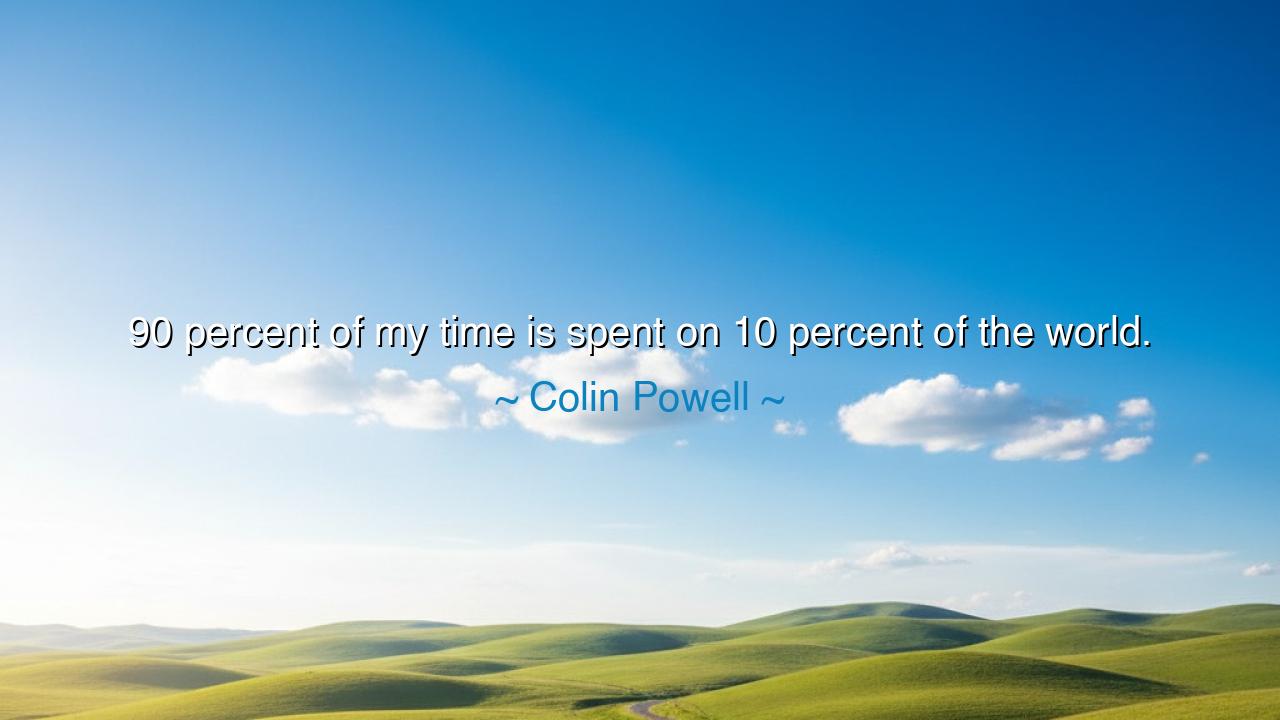
90 percent of my time is spent on 10 percent of the world.






In the calm yet powerful words of Colin Powell, soldier, statesman, and servant of the people, we hear a truth about leadership, struggle, and the burden of responsibility: “Ninety percent of my time is spent on ten percent of the world.” At first, these words seem to describe imbalance—a life consumed by endless demands from a small fraction of the earth. But within them lies a deeper understanding of the nature of power and duty. Powell speaks not as one overwhelmed, but as one awakened to reality: that in the vast field of human affairs, most of our energy must be devoted to the places where trouble burns the hottest, where peace is fragile, and where humanity’s wounds still bleed.
The origin of this quote lies in Powell’s years as a military leader and later as U.S. Secretary of State, when he was at the center of global crises. From the Balkans to the Middle East, from Africa to Central Asia, he witnessed firsthand how a small portion of the world could command the attention of all others. While the majority of nations lived in relative peace, a handful were torn by conflict, poverty, and despair—and yet it was there that the fate of the world often hung in balance. His words are thus not a complaint, but a confession of the burden of leadership: that those who serve must give their strength to the places where others cannot stand alone.
To say that “ninety percent of my time is spent on ten percent of the world” is to recognize a universal truth about life and labor. It is not only the affairs of nations that follow this pattern—so too do the affairs of the soul. Whether one leads a household or a nation, it is often the few things, the few people, or the few problems that demand the most of one’s heart. The small portion of life that is chaotic, broken, or painful consumes the majority of our energy and thought. The wise learn not to resent this imbalance, but to accept it as the cost of stewardship. For the measure of a person’s character is not how they act when all is well, but how they respond when a corner of their world cries out for healing.
Consider the story of Powell’s own service during the Gulf War. He led with restraint and discipline, balancing military might with diplomacy, always seeking to limit destruction and loss. The war itself was brief, but the preparation, negotiation, and aftermath consumed countless hours, decisions, and sleepless nights. The conflict represented but a fraction of the globe, yet its consequences reached into every corner of civilization. This was the essence of his quote: a recognition that the smallest fraction of the world’s pain can require the greatest portion of a leader’s attention, and that true leadership lies in giving that attention fully, even when the world outside remains quiet and content.
This truth extends beyond war and politics. Throughout history, the weight of humanity’s struggle has never been evenly shared. A handful of crises define the destiny of an era: the plague that swept through medieval Europe, the American civil rights movement, the collapse of the Berlin Wall. Each represented a small piece of the world’s geography, yet demanded the energy and conscience of an entire generation. Powell’s reflection is not about despair—it is about vigilance. It is a call to those who hold power, great or small, to focus their time not on what is easy, but on what is necessary.
But these words also reveal something of humility. Powell knew that one man cannot change the entire world—but he can tend to his share of it. And so he chose to dedicate his time where it mattered most, to the “ten percent” that shaped the course of the remaining ninety. This is the wisdom of the servant-leader: not to be everywhere at once, but to be wholly present where one’s presence is needed most. In this, there is both sacrifice and meaning—for to carry the burdens of others is to live a life of purpose.
So, my children, take this teaching to heart: your time is the currency of your soul, and where you spend it reveals what you love and what you serve. Do not waste it on trivial matters, nor seek to divide it evenly among all things. Instead, look for the “ten percent” in your own life—the people, the duties, the causes that need you most—and give them your all. The rest of the world may move along without your hand, but the part that depends on you will remember your faithfulness.
For in truth, Powell’s words are not merely about politics—they are about the eternal rhythm of human life. The greatest leaders, the truest servants, the wisest souls are those who understand that most of the world’s peace depends on the care of its wounded corners. And though it may seem unjust that so much energy must be spent on so few, it is in this very imbalance that the greatness of humanity is revealed. For as long as there are those willing to labor for the troubled few, there is hope for the many.






AAdministratorAdministrator
Welcome, honored guests. Please leave a comment, we will respond soon